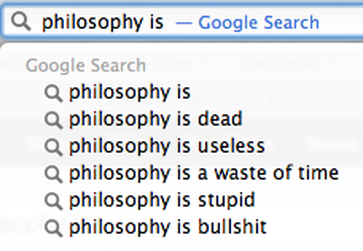Dostoevsky once wrote: “If God did not exist, everything would be permitted”; and that, for existentialism, is the starting point. Everything is indeed permitted if God does not exist, and man is in consequence forlorn, for he cannot find anything to depend upon either within or outside himself. He discovers forthwith, that he is without excuse.
What do we mean by saying that existence precedes essence? We mean that man first of all exists, encounters himself, surges up in the world – and defines himself afterwards.
Unfortunately, Sartre found little to like in the definition. And who can blame him in that era of fascism, totalitarianism, and brutal dictatorships ruling large swaths of the world. He also died before the invention of positive psychology, which has made a science of studying what it is we can do to live well and be happy, however you define that term. So Sartre wrote books and plays like Nausea and No Exit where protagonists were horrified by their own existence or trapped in a room after death with three other people who got on their nerves to such an extent that this line was uttered as a climax:
So that is what hell is. I would never have believed it. You remember: the fire and brimstone, the torture. Ah! the farce. There is no need for torture: Hell is other people.
It can often feel that way. The shopper who rudely cuts you off, the co-worker whose unyielding defensiveness sucks the air out of every meeting, the family members whose narrow ways cage you in, the politicians who only scheme for themselves and leave society in tatters. All of these have taken their turn as the straw attempting to break my back, causing me to question if this world can really be lived in, and reminding me of Don McClean's song lyrics that "this world was never meant for one as beautiful" as the artist Van Gogh. But people can be heaven too. Not literally, of course, but since Sartre was right that we can make of this world as we please, we can indeed cooperate to make this world pleasing. We all find that somewhere in our lives, and so we carry on, but I wonder where Sartre found his solace. Probably not in love. "The nature of Sartre and Beauvoir’s partnership was never a secret to their friends, and it was not a secret to the public, either, after they were abruptly launched into celebrity, in 1945. They were famous as a couple with independent lives, who met in cafés, where they wrote their books and saw their friends at separate tables, and were free to enjoy other relationships, but who maintained a kind of soul marriage. Their liaison was part of the mystique of existentialism, and it was extensively documented and coolly defended in Beauvoir’s four volumes of memoirs, all of them extremely popular in France. Beauvoir and Sartre had no interest in varnishing the facts out of respect for bourgeois notions of decency. Disrespect for bourgeois notions of decency was precisely the point."
This sounds very brave, but we know now the importance that conventional social bonds bring. They've become conventional precisely because of this. Because they work. They aid our happiness and survival over the long term. Recently, George Vaillant, who directed a study for more than three decades of the lives of 268 young men, published the study’s findings in the 2012 book Triumphs of Experience. The conclusions? “At a time when many people around the world are living into their tenth decade, the longest longitudinal study of human development ever undertaken offers some welcome news. In Triumphs of Experience, Vaillant raises a number of factors more often than others, but the one he refers to most often is the powerful correlation between the warmth of your relationships and your health and happiness in your later years."
Sartre, in contrast, attempted to celebrate his cool relationship while "his physical condition deteriorated, partially because of the merciless pace of work (and the use of amphetamines) he put himself through. He suffered from hypertension, and became almost completely blind in 1973. [He was also] a notorious chain smoker, which could also have contributed to the deterioration of his health."
How sad. As Joseph Epstein said in his Essays in Biography, "What is it about the study of philosophy that tends to make brilliant minds stupid when it comes down to what are known as actual cases? Consider Martin Heidegger, Bertrand Russell, Jean-Paul Sartre, and Ludwig Wittgenstein, the four great names in twentieth-century philosophy: the first was a Nazi, the second died certain that America was responsible for all the world’s evil, the third was a Stalinist long after any justification for being so could be adduced, and the fourth lived on the borders of madness most of his life. Contemplation of the lives of philosophers is enough to drive one to the study of sociology."
Before we go quite that far, let's take a look at the major beliefs of Jean-Paul Sartre and see how I evaluated them against my evolutionary philosophy.
----------------------------------------------------------------------------------------------------------------
Jean-Paul Sartre (1905-1980 CE) was a French existentialist philosopher, playwright, novelist, screenwriter, political activist, biographer, and literary critic.
Survives
Needs to Adapt
The main idea of Jean-Paul Sartre is that we are, as humans, "condemned to be free.” This theory relies upon his belief that there is no creator, and is formed using the example of the paper knife. Sartre says that if one considered a paper knife, one would assume that the creator would have had a plan for it: an essence. Sartre said that human beings have no essence before their existence because there is no Creator. Thus, "existence precedes essence.” This forms the basis for his assertion that since one cannot explain their own actions and behavior by referencing any specific human nature, they are necessarily fully responsible for those actions. "We are left alone, without excuse.” There is no evidence for a god or creator. Life has evolved blindly, without purpose, and from no essence. However, we do exist and the rules of evolution point towards ways to continue that existence. In that sense, evolution points existence towards an essence. That essence is immortal life. Life will evolve until it achieves it. We are not condemned to be free; we are free to live.
Gone Extinct
Originally, Sartre believed that our ideas are the product of experiences of real-life situations, and novels and plays can well describe such fundamental experiences, having equal value to discursive essays for the elaboration of philosophical theories such as existentialism. Later, Sartre concluded that literature functioned ultimately as a bourgeois substitute for real commitment in the world, and thus turned down a Nobel Prize for literature. Art has its purpose in society. Art instructs and inspires us. No art takes hold of the mind for the length of time that literature does. It is a useful and difficult pursuit.
----------------------------------------------------------------------------------------------------------------
The hashtag YOLO has become a dumbed-down twitter excuse for hedonistic, short-term focused partying lifestyles, but it is true—you do only live once. There doesn't appear to be any evidence for some cosmic essence that is driving our lives and development, so we must take charge of our own existence. That is a great takeaway from existentialism. What we do with that existence though, is still up for debate, and so far not to be advised by the examples of early existentialists themselves.




